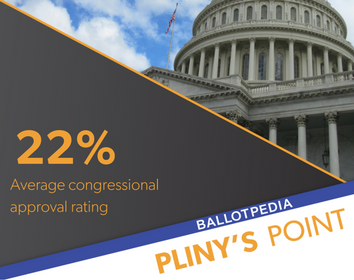Help us improve in just 2 minutes—share your thoughts in our reader survey.
Pliny's Point on March 20, 2017
March 20, 2017: An average of recent polls shows the approval rating for the 115th Congress at 22 percent. Individual polls range from 18 to 29 percent approval ratings. The average has not changed since early this month, though it has increased since Pliny's Point began on President Donald Trump's inauguration day, January 20, 2017. The chart below shows the change in average approval rating weekly.
All of the polls included in today's average are listed below.
| Source | Date range | Sample size | Job approval rating | Margin of error (+/-) |
|---|---|---|---|---|
| Economist/YouGov[1] | 3/13 - 3/14 | 1,315 registered voters | 18% | 3.3% |
| Quinnipiac University[2] | 3/2 - 3/6 | 1,283 registered voters | 18% | 2.7% |
| Gallup[3] | 3/1 - 3/5 | 1,018 adults | 24% | 4% |
| Wall Street Journal/NBC[4] | 2/18 - 2/22 | 1,000 adults | 29% | 3.1% |
| CBS News[5] | 2/17 - 2/21 | 1,280 adults | 22% | 3% |
For Ballotpedia's presidential approval, congressional approval, and direction of the country polling results, we take an average of the most recent polls on one or more of these topics conducted by 12 sources. Polls may be included in the average for up to 30 days, though this timeline may be adjusted to account for major news events as we attempt to balance the need for a larger sample of results with the need to remove outdated information. For a full description of our methodology and polling explanations, see: Ballotpedia's Polling Indexes.
What's in a name?
Pliny the Elder, a scholar from the Roman Empire, is most well known for writing the encyclopedic work Naturalis Historia, or “Natural History.” His extremely thorough work covered everything from botany to technology. Naturalis Historia, one of the largest Roman works that still exists from the first century A.D., became an example for future encyclopedic works through its formatting, references, and comprehensiveness.
Today, Ballotpedia works to preserve and expand knowledge, just like Pliny did hundreds of years ago. One of the features of Ballotpedia, the encyclopedia of American politics, was a daily statistic called Pliny’s Point. Each day, between January 20, 2017 and September 1, 2017, readers learned where Americans stood on the direction of the country, or their approval of elected officials.
Click here for more Pliny's Point articles.
See also
Ballotpedia daily polling averages:
Stay in the know:
- The Weekly Brew
- The Daily Brew
- You're Hired: Tracking the Trump Administration Transition, 2016-2017
- Policy issues under the Trump administration, 2017-2021
- 115th United States Congress
- Special elections to the 115th United States Congress (2017-2018)
Footnotes
- ↑ YouGov, "The Economist/YouGov Poll," March 13-14, 2017
- ↑ Quinnipiac University, "Trump Inches Up, But Still Has Negative Approval Rating, Quinnipiac University National Poll Finds," March 7, 2017
- ↑ Gallup News Service, "Gallup Poll Social Series: Environment (Toplines)," March 1-5, 2017
- ↑ Wall Street Journal, "NBC News/Wall Street Journal Survey," February 18-22, 2017
- ↑ CBS News, "Nearly six in 10 don’t think Trump understands the complicated problems a president faces," February 23, 2017


